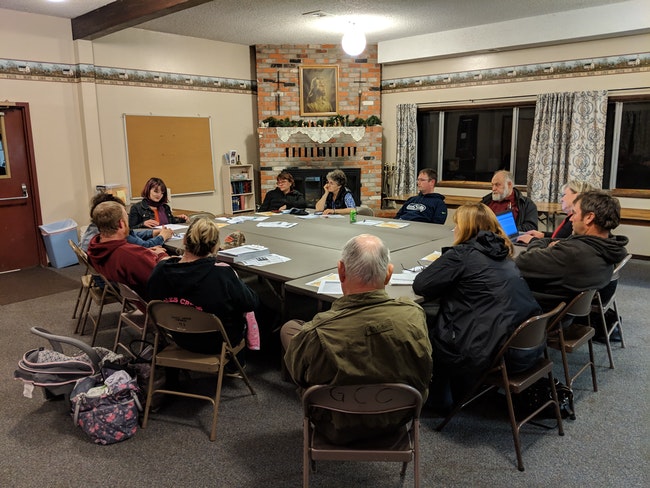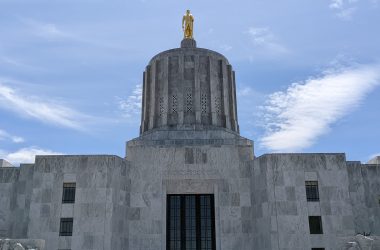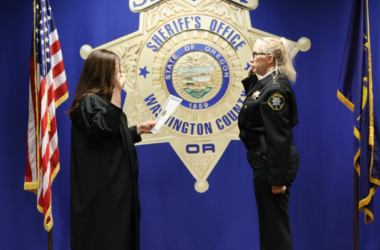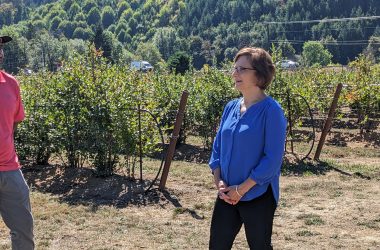 Rep. Mitchell speaks to western Washington County residents at a Dec 12 2018 CPO meeting in Gales Creek. Photo: Chas Hundley
Rep. Mitchell speaks to western Washington County residents at a Dec 12 2018 CPO meeting in Gales Creek. Photo: Chas Hundley
Oregon State Representative Tiffiny Mitchell (D-Astoria, District 32) announced via email newsletter that on October 16 she completed the process of becoming a living kidney donor.
Rep. Mitchell documented much of her experience on social media, where she shared her reasons for wanting to help another person who she did not personally know.
“About 10 years ago, I was interested in donating to a friend in need of a kidney,” Mitchell wrote in her email newsletter. “After I wasn’t a successful match for her (her mother was), I realized that it was still an incredibly important thing I wanted to do in my life — to help another person, even if I didn’t know who that person was.”
Mitchell told the Banks Post that a number of things happened throughout the years that created personal circumstances that made living donation difficult for her to pursue.
“I ended up moving back to Utah and had to start a new job, and you have to accrue time to take off,” she said. “Then, I decided to get a masters degree and it didn’t seem like the right time. Then, I got married and we moved to Oregon. There were just a bunch of circumstances that compounded it and made it harder for me to make that choice. The barrier for people who want to be a living organ donor is complicated with jobs and how much time one can take off for the required testing, and the actual donation and recovery period.”
Mitchell said she was able to find time during the 2019 Oregon Legislature’s interim session to follow through with her donation through Donate Life Northwest via the Living Donor Protection Act. Her donation was facilitated through a “non-directed” or “altruistic donation” with Legacy Good Samaritan Hospital, Mitchell said.
She explained in her newsletter that through her experience she learned that kidney donations from living people are more successful than donations coming from someone recently deceased, and that the vast majority of donations in the United States come from deceased donors.
Additionally, most donations are “directed,” meaning they are intended for a specific person. At any given time there are more than 100,000 Americans waiting for a kidney donation, Mitchell wrote.
“In realizing that there was such a shortage of organs out there, a switch went off in my head — that I was potentially holding on to my kidney, willing to donate it to someone I loved for a situation that might not ever exist again,” she said. “Meanwhile, 13 people die everyday waiting for a donation — people who have families and friends that might want to donate to their loved ones but are not a match. What if I could be a match and help them?”
Mitchell now is part of a movement, originally conceived by Nobel Prize-winning economists Alvin Roth and Lloyd Shapley, known as chain donation. The way it works is, let’s say someone wants to donate a kidney to a loved one, but they are not a match. At the same time, someone else wants to donate a kidney to their loved one but they also are not a match. However, the two donors are matches for the two people who are in need, even though they do not know each other.
Since the two donors were willing to donate a kidney already, the idea is to swap kidney donors so both people in need can receive a kidney even though it will not come from someone they know.
“Instead of me saying I’m not going to donate my kidney at all since my loved one is not a match, since I already was willing to do so and there is someone waiting for a kidney that I am a match for, we can swap kidney donors and two people get a kidney out of the swap,” Mitchell said. “In my case, as the altruistic donor, I can give to someone else whose original donor didn’t match up, and that donor can give to someone else whose original donor didn’t match up, and on and on down the chain. In my particular chain there were five people who ended up getting a kidney, one of whom was a really hard match to make.”
Mitchell pointed out that PBS News Hour published a story thoroughly explaining chain donations that can be viewed here.
“Ultimately, I would like to create an environment in Oregon that would make living organ donation a qualifying reason to take the needed leave from work, whether its for a loved one or altruistically,” Mitchell said.






